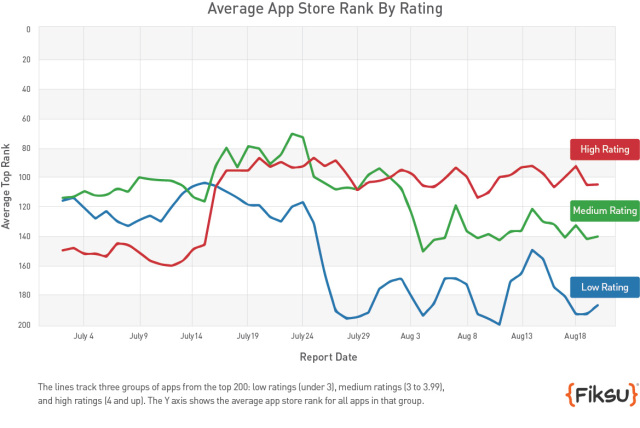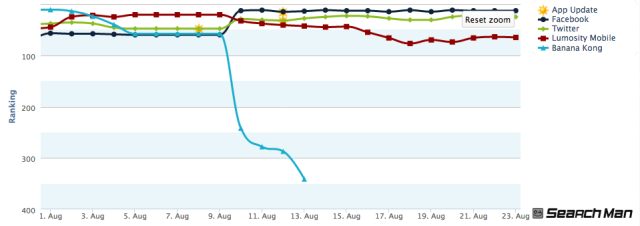Ranking algorithm changes in App Store
Apple is probably testing changes in the iTunes App Store's ranking algorithms — now, user feedback and some other new factors are taken into account to calculate the application’s position. Whether such changes are experimental in nature or indicate a new redistribution of ratings is not yet clear. However, they already lead to changes in the positions of applications in the tops - without increasing or decreasing the number of downloads.
The first thing that happened at the end of July was noted by Fiksu - applications with a rating of 4 or more received the best positions in the ratings. At the same time, applications with a rating of three and below lost their positions, despite the fact that the number of downloads remained relatively unchanged. Applications with average ratings (from 3 to 4) almost remained in their places.
Previously, the main parameter to determine the position of the application in the charts for the App Store was the number of downloads. Now, it seems, the opinion of users also began to take into account.
')

There is also some evidence that the estimates for the new version of the application may have a greater impact on the tops compared to the estimates for the old one - and in general this is quite logical. Imagine a scenario in which the developer releases an update to the well-known and already well-proven application that users do not like very much - for example, it pinches monetization. They begin to "minus" it - in such a situation, the fall of the positions of applications in the rating seems quite logical. In addition, feedback can prevent applications from getting into the tops, such as outright spam - yes, they will get downloads, but negative user feedback will prevent them from becoming leaders.
Another change noticed by Fiksu is the update frequency of the tops. In the past, they were updated every 15 minutes, which allowed developers to practically (in real time) observe (and change) how the settings affect the application positions. Now the position changes every three hours.
They say that this change will help the App Store to deal with those who use automated tools cheat. Potentially, the slowdown will give Apple time to identify “short peaks of downloads,” explains Fiksu, which is usually associated with robots and other non-organic downloads. In theory, the delay can also allow Apple to study the anomalies in how the downloads proceed, and prevent those applications that buy them from getting into the charts.
Appsfire Director Oriel Oayon also notes that some developers have discovered that Apple began to consider returns and process money data in a different way for free-to-play games. He specifically drew attention to changes in the Top Grossing Ranks, noting that Pandora and Rdio had never reached such positions before.
However, he warns that these changes do not mean that Apple has completely eliminated the possibility of rating manipulations. “Everyone still plays in the ratings, and position improvement can still be achieved with the help of many ad networks, even with a reduction in the update time to 3 hours,” he adds.
The head of MobileDevHQ, Jan Sefferman, noticed another change in the App Store. Search results for iPhone applications vary if you search from an iPad or from an iPhone. If we take into account the data of Fisku about the changes, then we can assume that Apple finally took up in general the opening of applications, and not just the improvement of the charts.
Niren Hiro from SearchMan also reports that developers in the US and Japan talked about the impact of user engagement (time spent in the application, number of launches, etc.) on the position in the category, and that from August 5 these changes are taken into account in all countries.

As with any changes, the new Apple algorithms will certainly soon be the object of close attention of developers. They will try to minimize the damage from innovations - for example, in the case of ratings, redirect negative reviews to third-party services, and skip to the App Store only positive ones. It's Apple’s job to keep track of this and maintain the integrity of its store and ranking algorithms. New factors seem to be quite interesting and objective for developers - after all, at the leading positions in the store, both we and Apple want to see high-quality and exciting applications.
The first thing that happened at the end of July was noted by Fiksu - applications with a rating of 4 or more received the best positions in the ratings. At the same time, applications with a rating of three and below lost their positions, despite the fact that the number of downloads remained relatively unchanged. Applications with average ratings (from 3 to 4) almost remained in their places.
Previously, the main parameter to determine the position of the application in the charts for the App Store was the number of downloads. Now, it seems, the opinion of users also began to take into account.
')

There is also some evidence that the estimates for the new version of the application may have a greater impact on the tops compared to the estimates for the old one - and in general this is quite logical. Imagine a scenario in which the developer releases an update to the well-known and already well-proven application that users do not like very much - for example, it pinches monetization. They begin to "minus" it - in such a situation, the fall of the positions of applications in the rating seems quite logical. In addition, feedback can prevent applications from getting into the tops, such as outright spam - yes, they will get downloads, but negative user feedback will prevent them from becoming leaders.
Another change noticed by Fiksu is the update frequency of the tops. In the past, they were updated every 15 minutes, which allowed developers to practically (in real time) observe (and change) how the settings affect the application positions. Now the position changes every three hours.
They say that this change will help the App Store to deal with those who use automated tools cheat. Potentially, the slowdown will give Apple time to identify “short peaks of downloads,” explains Fiksu, which is usually associated with robots and other non-organic downloads. In theory, the delay can also allow Apple to study the anomalies in how the downloads proceed, and prevent those applications that buy them from getting into the charts.
Appsfire Director Oriel Oayon also notes that some developers have discovered that Apple began to consider returns and process money data in a different way for free-to-play games. He specifically drew attention to changes in the Top Grossing Ranks, noting that Pandora and Rdio had never reached such positions before.
However, he warns that these changes do not mean that Apple has completely eliminated the possibility of rating manipulations. “Everyone still plays in the ratings, and position improvement can still be achieved with the help of many ad networks, even with a reduction in the update time to 3 hours,” he adds.
The head of MobileDevHQ, Jan Sefferman, noticed another change in the App Store. Search results for iPhone applications vary if you search from an iPad or from an iPhone. If we take into account the data of Fisku about the changes, then we can assume that Apple finally took up in general the opening of applications, and not just the improvement of the charts.
Niren Hiro from SearchMan also reports that developers in the US and Japan talked about the impact of user engagement (time spent in the application, number of launches, etc.) on the position in the category, and that from August 5 these changes are taken into account in all countries.

As with any changes, the new Apple algorithms will certainly soon be the object of close attention of developers. They will try to minimize the damage from innovations - for example, in the case of ratings, redirect negative reviews to third-party services, and skip to the App Store only positive ones. It's Apple’s job to keep track of this and maintain the integrity of its store and ranking algorithms. New factors seem to be quite interesting and objective for developers - after all, at the leading positions in the store, both we and Apple want to see high-quality and exciting applications.
Source: https://habr.com/ru/post/191234/
All Articles